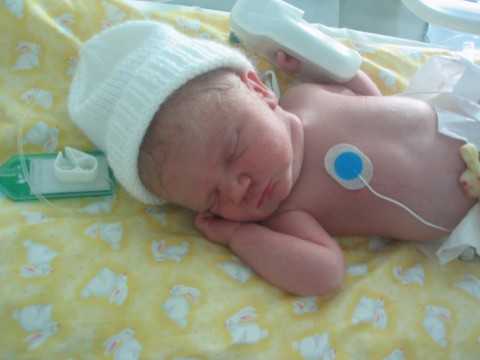Preemies are Born Before They’re Full-Term
Premature babies, commonly called “preemies,” arrive into the world earlier than expected. Since preemies are born before they’re full-term (37 weeks of gestation), they are susceptible to serious health problems. They may require special care in the neonatal intensive care unit at the hospital, and their prematurity can have long-lasting effects on their development. For example, eye development problems are common in premature infants.

Retinopathy of Prematurity ““ Eye Disorder that Affects Preemies
Retinopathy of prematurity is a common eye disorder that affects preemies that are born before 31 weeks of pregnancy and have a birth weight of less than 2.75 pounds (1250 grams). The smaller the preemie is, the higher his or her risk of developing this disorder. Retinopathy of prematurity typically affects both eyes, and it can lead to lifelong vision impairment and even blindness.
In normal fetal development, the blood vessels of the retina start to develop at 16 weeks pregnant. When your baby is full-term, the blood vessels have finished developing. When an infant is born too early, this eye development can become disrupted. The blood vessels might stop growing, or they may grow abnormally from the retina. Since these blood vessels are fragile, they can leak. As a result, scar tissue can form. As the scars shrink, they can pull the retina from the inner surface of the eye. When damage is severe, this can lead to vision loss or blindness. The severity of this eye development problem can range from mild to severe, depending on how early the preemie was born. The earlier the baby is born, the higher his or her risk of developing this condition.
Although retinopathy of prematurity sounds scary, the rates have decreased dramatically in recent decades, thanks to better NICU care. Fortunately, not all preemies who are less than 2.75 pounds will develop the condition. Out of the 3.9 million newborns that are born in the United States annually, only 28,000 babies are born under 3 pounds. Between 14,000 to 16,000 will develop retinopathy of prematurity to some degree, but 90 percent of these preemies have mild symptoms and don’t require treatment. Only 400 to 600 babies will become legally blind from retinopathy of prematurity.
When the case is more serious, doctors will retreat retinopathy of prematurity with laser therapy, cryotherapy, and eye surgery.
Preemies who suffer from this eye development problem are at increased risk of other eye diseases in the future, including glaucoma, lazy eye, crossed eyes, nearsightedness, and retinal detachment.
Other Eye Development Problems in Preemies
Premature babies can also face other eye development problems. For instance, crossed eyes (called strabismus) affect more preemies than full-term babies. Your preemie baby’s eye alignment may be unsteady for a few months, but they should be straight by four or five months of age. You will want to consult a pediatric ophthalmologist or an eye doctor if you’re concerned.